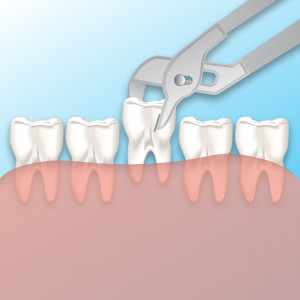Extractions
 Dental decay or accidents can cause severe damage to your smile. In some cases, they can ruin otherwise healthy teeth. Most times, dentists can save a damaged tooth with the many restorative treatment options available. Yet, sometimes the damage to a tooth is too severe, leaving tooth removal as the only option.
Dental decay or accidents can cause severe damage to your smile. In some cases, they can ruin otherwise healthy teeth. Most times, dentists can save a damaged tooth with the many restorative treatment options available. Yet, sometimes the damage to a tooth is too severe, leaving tooth removal as the only option.
If your tooth can not be saved through restorative measures, the alternative is tooth extraction.
What are tooth extractions?
The removal of a damaged or decayed tooth is called a tooth extraction. There are many reasons why you might have a tooth extracted.
Why are tooth extractions needed?
Dental decay is most often the reason a tooth needs an extraction, yet it is far from the only reason. Sometimes accidents happen. They are a part of life. If you play sports without mouth protection, you risk damaging or knocking a tooth out. Sometimes a violent encounter can lead to severe dental damage. Sometimes, an extraction is necessary to prepare your mouth for a dental restoration. Each situation is unique.
What causes dental decay?
Harmful mouth bacteria can cause dental decay. Mouth bacteria thrive on the sugary carbs that we eat and drink every day. Yet, when you brush and floss your teeth every day, mouth bacteria is washed away.
Not everyone adheres to a consistent, daily oral hygiene regimen. We lead busy lives and, amidst the chaos, sometimes things that don’t really seem to matter are disregarded or forgotten. This can happen with oral hygiene. The problem occurs when oral hygiene is not practiced at all or not often enough. This gives mouth bacteria an open invitation to move in. When they do, they eat away at tooth enamel and drill cavities into your otherwise healthy teeth. If a cavity is left to fester for too long, severe and permanent damage occurs. A tooth that cannot be repaired or restored with a dental restoration needs to be extracted.
How can I prevent dental decay in the future?
Preventing tooth decay is simple. All you need to do is:
- Brush your teeth twice a day, every day for at least two minutes each time (preferably before bed and when you wake up);
- Floss your teeth at least once daily;
- See your dentist for regular dental checkups;
- Make healthier food choices by reducing your consumption of sweets and reserving them for occasional treats;
- If you must indulge, or are not able to brush your teeth, drink water until you can brush your teeth.
Why would I need tooth extractions for dental restorations?
Some types of dental restorations need one or more teeth extracted. This is particularly true if the tooth is damaged or decayed to begin with. Sometimes tooth extractions are needed to prepare for partial or complete dentures, or bridges. One or more teeth may need to be extracted to help address overcrowding. There are many reasons why tooth extractions become necessary.
What happens during a tooth extraction?
When Dr. Gotora determines that a tooth extraction is needed, he will first numb the treatment area with a local anesthetic. If you have any dental anxiety or need additional comfort measures, he may suggest the use of sedation dentistry.
Once numb, the tooth extraction will take place. The tooth does not always come out in one piece. In some cases, Dr. Gotora may need to break the tooth into smaller pieces to help preserve underlying bone. If needed, Dr. Gotora will then close the socket with a couple of stitches over the vacant tooth socket.
What can I expect after my tooth extraction?
Once your tooth is extracted, Dr. Gotora will talk to you about how to care for your mouth while it heals. It is normal for your mouth to remain numb for the first couple of hours. The anesthetic will take time to wear off. After it wears off, if you experience pain, you can use over-the-counter pain relief. It is usually recommended to take the pain reliever before the freezing wears off to reduce any discomfort. Use ice packs or frozen veggies wrapped in a towel, if you have any swelling. Only use ice for 20 minutes at a time.
Eat soft foods for the first few days. They will be easier to eat than hard foods.
Avoid using straws or smoking for the first few days. This is to avoid a painful condition called dry socket. Dry socket is a painful, inflammation of the empty tooth socket. After tooth extraction, a blood clot forms to protect the empty socket for the first few days. Using a straw and smoking cause pressure changes in your mouth, as does vigorous rinsing. This change can dislodge the blood clot. Once gone, the socket can become inflamed and painful.
Where can I get a tooth extraction in my area?
Finding a dentist in Silver Spring or Hyattsville, Maryland, is easy. Stellar Dental has offices in both of these locations for your convenience. If you believe you may need a tooth extraction, come see Dr. Gotora at Stellar Dental today. Contact us at Silver Spring (301) 754-1900 or Hyattsville (301) 853-1567. We can help with all your tooth extraction needs.





